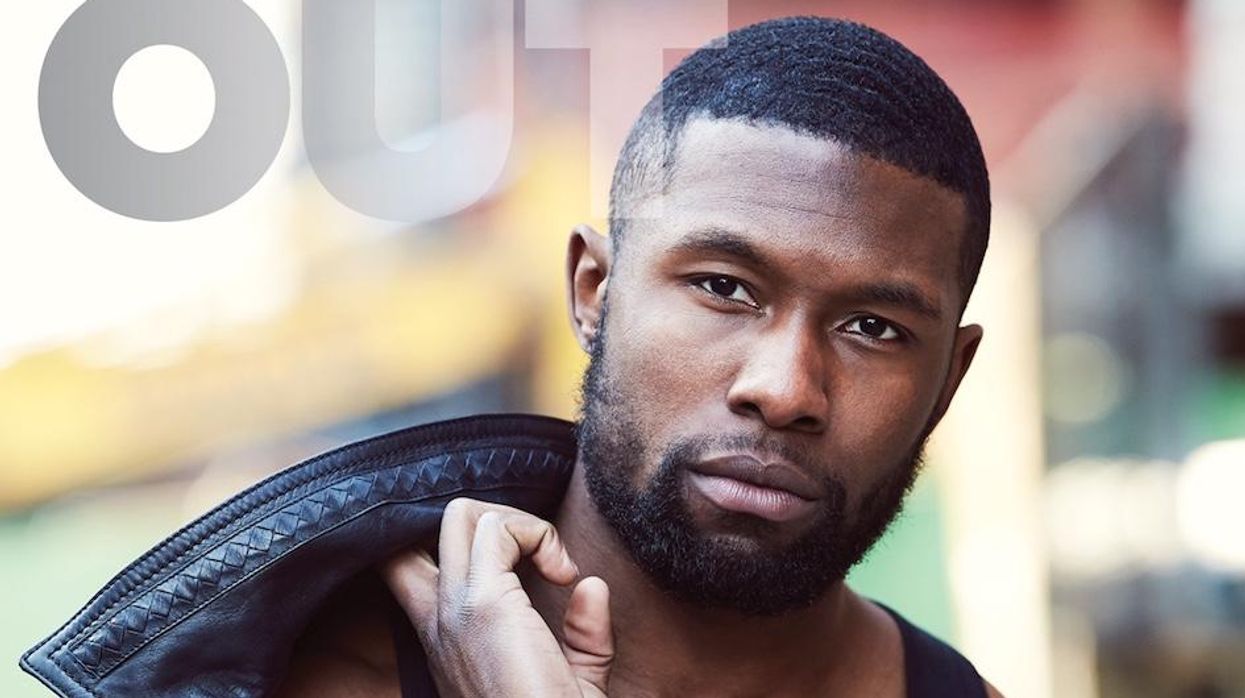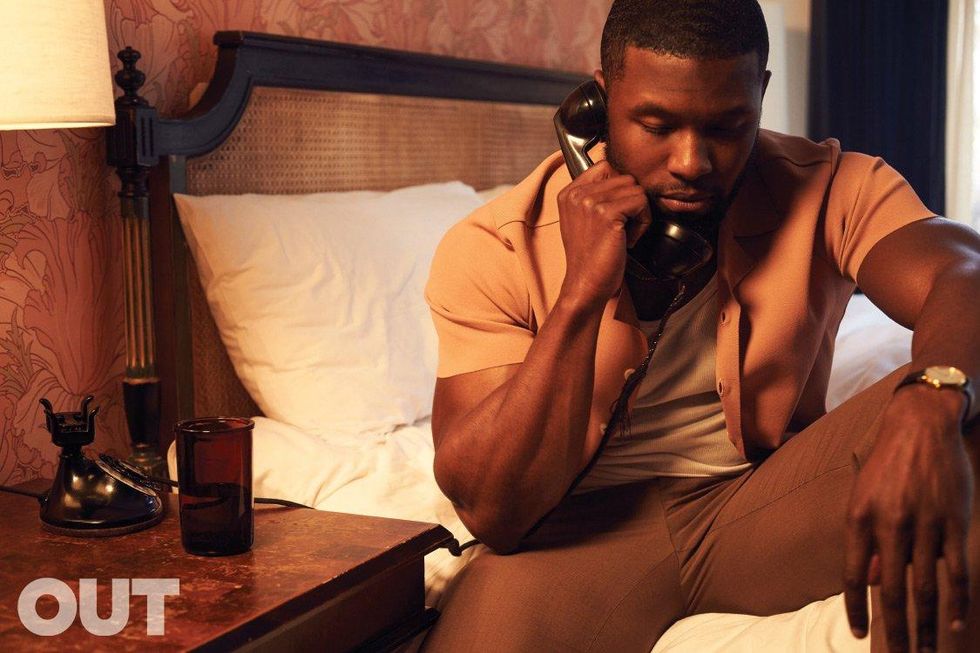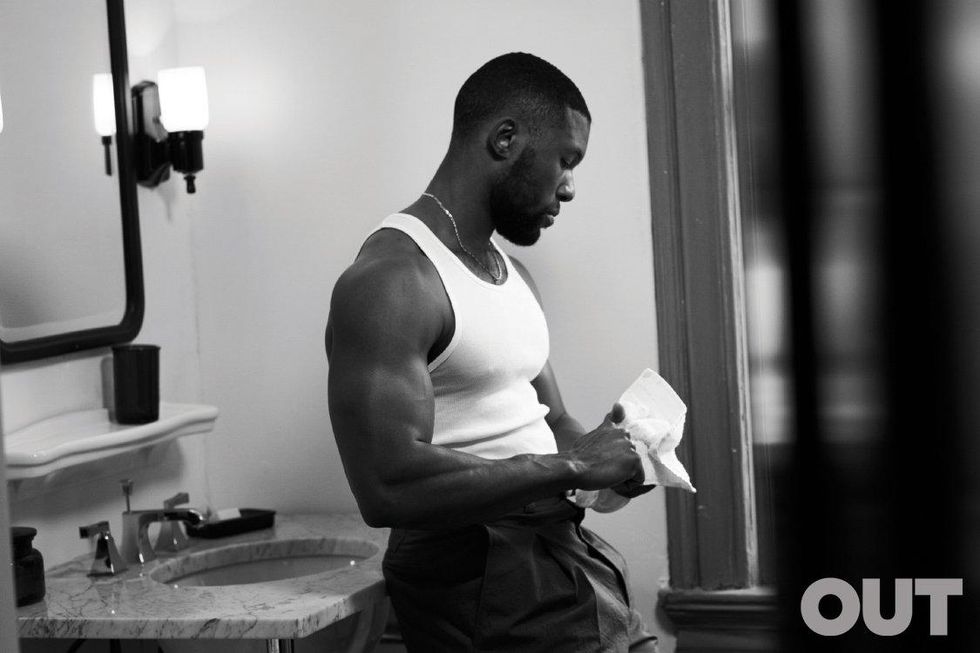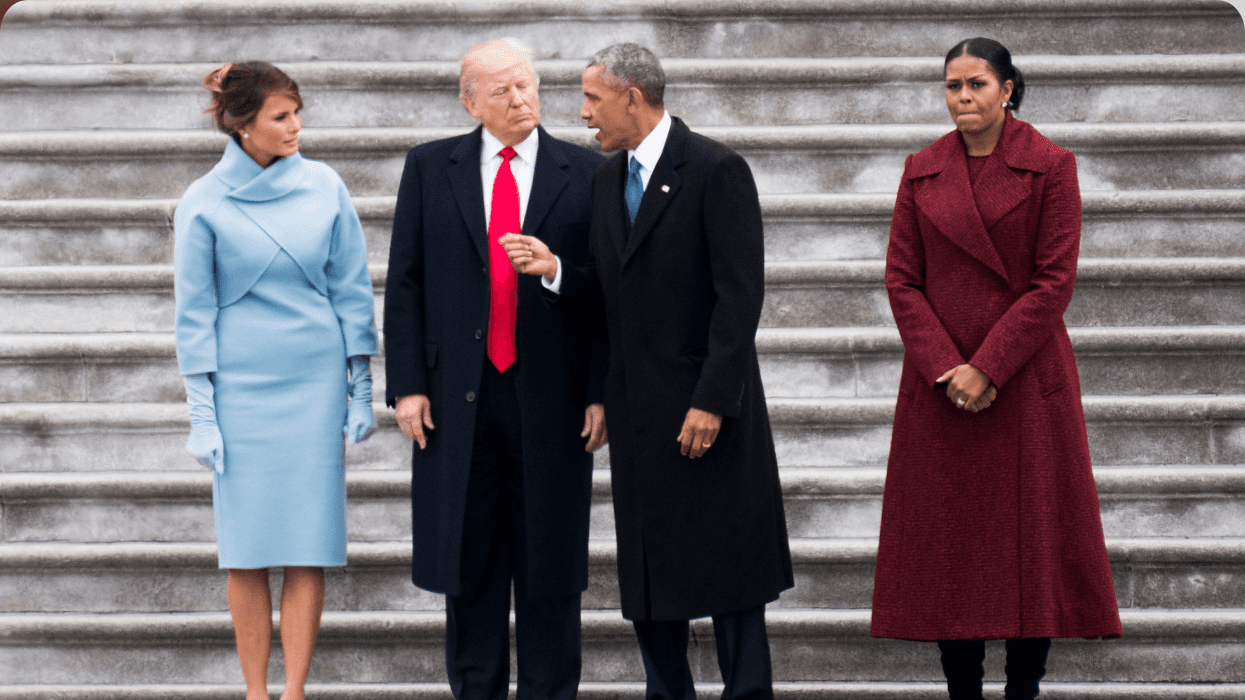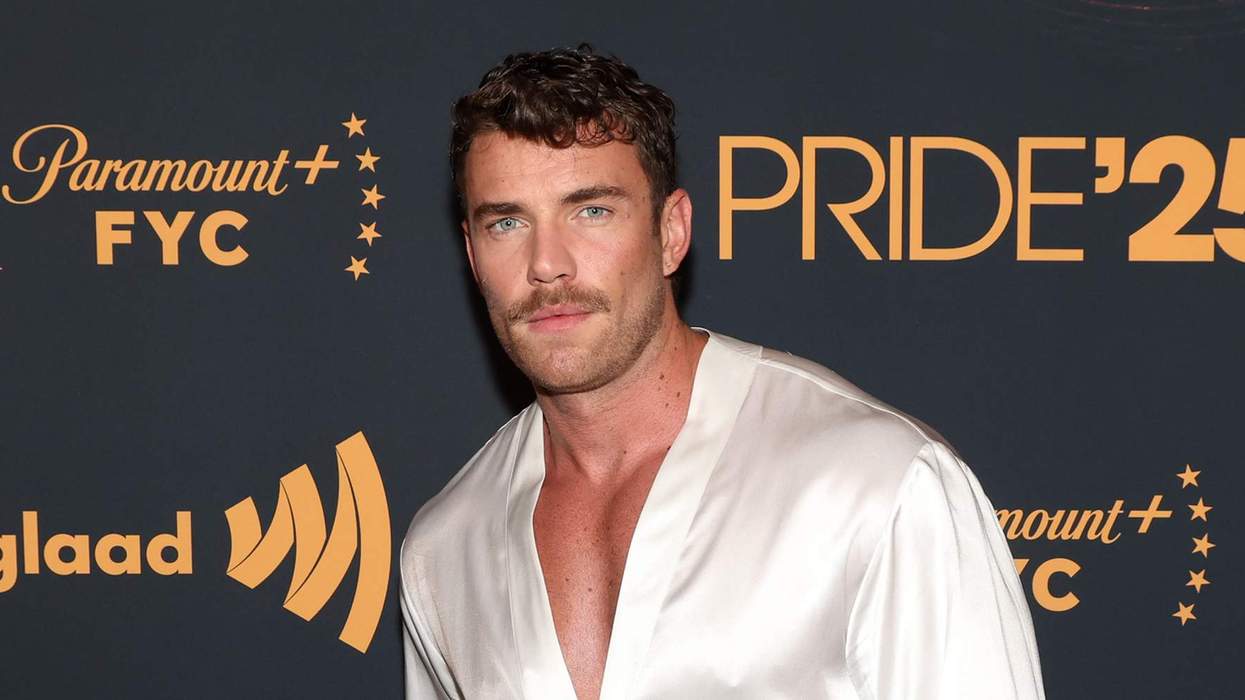How many young actors, let alone young black actors, would choose a gay movie as their first real introduction to the world? Regardless of one's orientation, Hollywood, for all its left-leaning bloviation, is still homophobic -- and pretty racist. Once upon a time, not so long ago, playing gay was a shortcut to either obscurity or an Oscar, depending on how well you died at the end of the film.
But Moonlight is not just any gay movie. And Trevante Rhodes is not just any young actor. He is a black man in 2017. And he is completely at home in his skin, obsidian dark and carrying the weight of America's sins; in his sexuality -- straight, if it matters, and it somehow always does; and within his body, powerful, gladiatorial, that of a college and lifelong athlete. It was this body -- both his comfort in it, and its discomfiting presence -- that earned him his breakout role as the adult version of Moonlight's central character, Chiron.
Related | Trevante Rhodes & Moonlight, In Focus
This body had to convey the story of a man who has built an armor of musculature around the painfully shy little boy who was bullied mercilessly for a reason he couldn't quite understand -- and who was still visible in the 27-year-old's soulful eyes. Rhodes recognized the opportunity he had in Moonlight, the opportunity to do something that had never -- or at most, rarely -- been done before.
"It's uncharted territory," he says with what seems like an innate giddiness, not the joy of someone experiencing the first heady rush of fame. "The fact that it was done, and the fact that it was done so well -- that's just an added benefit of being able to tell a truthful story, a truthful story that hasn't been seen in the way that it's now been seen. Hopefully I'll continue to do great work, but to do great work that's never been done? That's like, we invented fire -- the world benefits from that. And I think the world will benefit from the film if they see it. Not just the black community, or the gay community, or the black gay community, but, fuck, the world."
Rhodes was taken with Moonlight's script and how deeply it delved into Chiron's life, likening the character's progression to a flower, suddenly besieged by snow, only to emerge intact, gorgeous as ever, come spring. "It was just the most beautiful thing I've ever read," he says. And in taking on the role, Rhodes saw a chance to grow as an actor and a person, to experience things he'd never experienced before and to learn the film's greatest lesson (should it have a lesson at all): empathy.
"It's an incredible work of art, and it's about a very, very marginalized group of people," he says. "I've had moments with many people who come up to me, red in the face, crying, tearing up because this is their story. They've never seen themselves put into a narrative on screen. How am I going to feel that again? I don't think you can. At the core of it all, you just want to do something that makes someone else feel OK."
i. An Experiment in What Life Could look Like
When The Birth of a Nation debuted at the Sundance Film Festival last January, it felt like the Great Black Hope. The film industry, stinging from the backlash of #OscarsSoWhite, was eager to embrace Nate Parker's opus about Nat Turner and his bloody slave rebellion of 1831. Too eager. It sold for a record $17.5 million. Talk of trophy gold was early and fervent. Then came the rape allegations from Parker's past; his insufficient, cavalier public response to them; lukewarm reviews of the film; and tepid box-office returns. Subsequently, The Birth of a Nation was stillborn. But while Parker's film slowly imploded, a smaller, quieter Great Black Hope emerged -- and it was queer and stunning and said what so many little black queer boys have waited to hear their entire lives, for generations: I am here, I am human, I exist.
Depictions of black queer men in film have been few and far between: Jason Holliday in Portrait of Jason (1967); Lindy in Car Wash (1976); Hollywood in Mannequin (1987); Marlon Riggs's Tongues Untied (1989); Isaac Julien's Looking for Langston (1989); of course, Paris Is Burning (1990); Rodney Evans's Brother to Brother (2004) and The Happy Sad (2013); and Patrik-Ian Polk's The Skinny (2012). It's been 50 years since Shirley Clarke's cinema verite documentary introduced the world to Jason Holliday, the spiritual ancestor of Moonlight's Chiron. Portrait of Jason was the first time a film considered the black homosexual in America. Upon its premiere, Ingmar Bergman called it "the most extraordinary film I've seen in my life," but it was largely forgotten until the release of a restored print on DVD in 2013; in 2015 it was added to the National Film Registry. Then in 2016, Paris Is Burning was afforded the same honor for being "culturally, historically, or aesthetically significant."
These two films about queer people of color have been deemed important by the Library of Congress and given official acknowledgement by the government and, by extension, America. Still, both were directed by white women, far removed from the worlds they were depicting. This disconnect, no doubt, helped bridge the gap between their disparate worlds of subject and audience -- asking the question, "Who is the intended audience?" -- but also led to familiar criticisms of cultural appropriation and exploitation. It was as if these stories were only valid when refracted through a white lens. But 50 years after Portrait of Jason, black people have taken control of their own narratives in an unprecedented wave of creative liberation.
Playwright Tarell Alvin McCraney wrote In Moonlight Black Boys Look Blue, on which Moonlight is based, in the summer of 2003, in the midst of graduating from Chicago's DePaul University and losing his mother to AIDS-related complications. At a crossroads, McCraney was filled with questions -- about himself, about life, about going out into the world -- that he could not turn to his mother to answer. Neither a traditional stage or screen play, In Moonlight served as a "circular map" for McCraney, a way to locate himself, socially and historically.
"I was very afraid of what my life would look like," he says. "I was very lonely. I still feel very alone most of the time and so I tried to figure out and put down as much of the memory that I could. I think it was an experiment in what life could look like."
With his circular map, McCraney explored unconventional ways of healing, wrought from his childhood experiences -- he estimates about two thirds of Moonlight, the finished film, is autobiographical, containing characters based on real people in his life. He gives an example of telling a story to his writing class about "Juan" (played in the film by Mahershala Ali) teaching him how to ride a bike.
"They kind of looked at me odd, like, 'Oh, why would he do that? Why would a drug dealer teach you how to ride a bike?' " McCraney recalls. "As if he had no care, as if his only preoccupation was the doing of this thing that is deemed harmful and illegal. But those two things existed at once."
In McCraney's world, drug dealers are father figures, kids play soccer with balled-up newspapers, and homosexuality is best left unsaid, unacknowledged, and unexplored. Moonlight director Barry Jenkins grew up in this same world, the world of the Liberty Square projects in Miami, around the same time as McCraney. They both had mothers plagued by drug addiction. And yet Jenkins was unsure he was the right person to take on Moonlight.
ii. Who Is You?
"I felt that there was a lot of responsibility in the fact that we don't see movies that are centered on the coming-of-age of a young gay black man," says Jenkins. "Because there are so few of those depictions, the ones that do exist take on added importance."
Though this responsibility weighed heavily on him, Jenkins was particularly hesitant because he hadn't directed anything since his 2008 debut feature film, Medicine for Melancholy. And on top of that, he wasn't gay. When he first read McCraney's In Moonlight Black Boys Look Blue, through Miami's Borscht art collective, Jenkins didn't really know what to make of it, but upon the urging of a friend to read it again, he was struck by Chiron's relationship with his mother, which mirrored his own.
In Moonlight, Naomie Harris plays a composite of both Jenkins's and McCraney's mothers. She is at times monstrous and unrelenting; other times she is childlike or maternal or tender. But her demons always bubble not too far under the surface. Her scenes are some of the finest and most visceral in Moonlight, but they were especially hard for Jenkins to film.
"When you're watching an actor who's gifted go to these places -- getting you closer to these themes you have embedded in your memory -- it's very difficult to just be creating art," he says. "Like, no, no, no -- I'm feeling shit."
It was only after speaking with McCraney over the course of several months that Jenkins reached a point where he felt that he could both preserve and respect the playwright's voice -- and feel free to fully develop the character of Chiron. Jenkins took McCraney's circular map and made it more linear, dividing it into three distinct acts, portraying Chiron at three different stages of life. He also added the final encounter between Chiron and Kevin, which McCraney had not included in his original piece.
"This is one thing I haven't gotten to talk to Tarell about: Who the fuck is Kevin? Who is his real Kevin?" says Jenkins. "I feel like, in writing the piece, he didn't include that story because either, I don't know, he felt like he had gone far enough delving into his personal relationship to Kevin, or they never got that moment in his actual life."
Jenkins felt that reuniting the two was an effective way to fuse his voice with McCraney's, and to pose the central question of the film: Who is you? "Not who are you," Jenkins clarifies. "Who is you?" The phrasing is important, because "Who is you?" keeps it 100, as it were. It appeals to Chiron's truest self. And it's not a simple question. Case in point: Jenkins, McCraney, and Rhodes -- the three men closest to Chiron -- all had radically different answers to my central question of the film: What happened to Chiron and Kevin after the final scene, in which Kevin cradles the adult Chiron in his arms, before Jenkins cuts to a flashback of a young Chiron on a moonlit shore, the ocean stretched out in front of him? Says Rhodes, "They're like 90 years old right now walking hand in hand in the park."
If he believes in their love story, McCraney is more skeptical. "Nah, of course Trevante said that. He's pure joy," he says. "He's full of peace and love."
He adds, "I'm like, I know the characters had to talk about Kevin punching Chiron in the face. At some point. But I have no idea." Instead of imagining a happily-ever-after, McCraney is pleased that Jenkins ended the film the way he did, leaving Kevin's and Chiron's fates to the audience, and to the characters themselves. "Isn't it great that they have some authority over their own lives and their own narratives from this point on?"
But perhaps Jenkins has the most satisfying answer: "Chiron struggles with the idea that he's unworthy of love, and he's been in that place for a very long time," the director says. "I think for him to get to that admission that he makes in the kitchen at the end -- that Kevin is the only man who has ever touched him -- it takes a lot. I mean, it takes a lot. It takes maybe 99 percent of him. So I don't know where he goes from there. I've been in that place, and what usually happens is, you gotta build yourself back up. I don't know if Kevin is going to be there to build him up as a lover, but I'm quite sure he'll be there to build him up as a friend. He's not there to possess him. I don't know if those characters ever possess each other fully."
iii. You Have a Right to Be Here
There's something life-affirming in seeing a stage of beautiful black faces and beautiful black bodies, dressed to the nines, being praised and honored, simply for being themselves. But behind those smiles is the shared truth that this is no small feat. Moonlight has racked up a staggering number of awards since the start of the awards season: Accolades have poured in from the National Board of Review, New York Film Critics Circle, Los Angeles Film Critics Association, Gotham, Satellite, Independent Spirit, Broadcast Film Critics Association, and British Independent Film. In January, it won Best Picture (Drama) at the Golden Globes. As we go to press, inevitable Oscar nominations are around the corner. But for the men behind Moonlight, the awards matter only if they inspire people to go see this little movie that could.
"All I have to say is, please," Jenkins said at the Globes, clutching his trophy in his right hand, "tell a friend, tell a friend, tell a friend. Much love."
For a moment, it seemed possible that Jenkins wouldn't get to speak, as one of the producers, a white woman, took the mic first -- but she understood this was not her story to tell or her award to accept. Barry Jenkins belonged there. Trevante Rhodes belonged there. Tarell McCraney, though absent as he often is from these ceremonies, belonged there. This story, this coming-of-age tale of a young black gay man, belonged there -- in film, in Hollywood, in America.
James Baldwin said, "When you try to stand up and look the world in the face like you have a right to be here, you have attacked the entire power structure of the Western world."
And that's really the crux of it. Black people, queer people, Latino people, Muslim people, the so-called Other -- for eight years, these people all stood up and dared to claim a piece of the American pie because they had someone in the White House who said they could, that they should, and that he supported their right to do so. It was inevitable, then, that with the power structure under attack, the silent majority would react to ensure its own survival. But once you stand up, it's impossible to sit back down again.
Twenty years ago -- five years ago -- Moonlight's success would have been unimaginable. But there is a poetry in the fact that it came at the tail end of something else that, until it happened, also seemed unimaginable. "We were launched into the Obama era with no notion of what to expect, if only because a black presidency had seemed such a dubious proposition," Ta-Nehisi Coates wrote in December in "My President Was Black," his comprehensive Obama history. "There was no preparation, because it would have meant preparing for the impossible."
As impossible as Barack Obama's road to the White House had seemed, eight years of having a black man as commander in chief was emboldening. In 2016, the final year of his presidency, the year that gave us Trump as a rebuttal to that boldness, we saw Beyonce exalt Black Pride at the Super Bowl, the biggest stage on the planet; we saw her sister Solange crystallize the anguish of police brutality and systemic racism with her acclaimed album A Seat at the Table; we saw Paul Beatty win the Man Booker Prize (the first American, black or otherwise, to nab the prestigious Brit literary award -- just a year after gay black writer Marlon James did); we saw #BlackGirlMagic in full, medal-snatching force at the Rio Olympics; we saw Donald Glover's Atlanta and Issa Rae's Insecure and Ava DuVernay's 13th and Queen Sugar add further glimmer to television's golden age; and we saw Moonlight hailed as a masterpiece, lauded the best film of the year by a chorus of gushing critics.
What we witnessed was a thrilling renaissance of black culture and black identity. So there was no need for one Great Black Hope when, as evinced by this impressive proliferation of art and achievement, hope has already been sewn into the nation through Obama's presidency. This renaissance will continue because it has to. Art flourishes in the harshest of climates, like the flower in Trevante's analogy; this most beautiful thing will survive the winter ushered in on Election Night last November because art thrives not in spite of, but because of, the cold. Just as we will thrive and create and continue to hope because we -- the Other -- have stood up and declared our presence. And it's too late to sit back down again.
Photography: Blair Getz Mezibov
Styling: Grant Woolhead
Market Editor: Michael Cook
Photo Director: Greg Garry
Groomer: Adam Makarian
Shot at The High Line Hotel, NYC
Like what you see here? Subscribe and be the first to receive the latest issue of Out. Subscribe to print here and receive a complimentary digital subscription.


